FEMA adopts changes to grants process
Learn more about the Redundancy Elimination and Enhanced Performance for Preparedness Grants Act from FEMA Administrator Craig Fugate
wfedstaff | June 3, 2015 3:16 pm
By Vyomika Jairam
Federal News Radio
Changes are coming to the Federal Emergency Management Agency’s homeland security grants process.
The House and Senate have passed a bill that requires FEMA to assess the efficiency and effectiveness of the grants it gives out.
The bill now goes to President Obama for his signature. The Federal Drive spoke to FEMA Administrator Craig Fugate about the bill and about his priorities for the agency in 2011.
The first questing in dealing with preparedness, Fugate said, and especially in evaluating grants that seek to increase community preparedness, is metrics.
“How do you really measure a level of increased preparedness?” Fugate said.
Especially outside of an actual disaster response
“Oftentimes the only indicator that stands up is an actual response of how well you did, but how do we really measure that outside of a disaster to show that the invest of time and funds have actually prepared our communities better?” Fugate said.
Among FEMA’s efforts in communities has been revamping exercise programs and program guides. Fugate said that community exercises have shown to be effective, but they need to be redesigned to better include the community. Responders and emergency personnel are obviously critical in disaster exercises, but they do not and cannot operate in a vacuum, so incorporating the community is important.
In a disaster situation, a community includes infants and children and members with language and financial barriers, Fugate elaborated. FEMA has to “build that into our exercises, and invite and include participation of the community in these exercises to demonstrate not only what we are doing, but also to help educate the public on their roles during disasters,” Fugate said.
Along with that, Fugate believes that there needs to be a change in attitude in working with the community.
“It’s taking the approach that the public is not a liability, they’re a resource when disaster strikes,” Fugate said.
Part of working with the public is reaching the public where they are, and Fugate has made incorporating social media into FEMA’s protocol on of the agency’s priorities.
“it’s what the public is doing so if we’re going to really be part of a team and look at how we support the public in disasters we need to communicate the way they’re communicating,” Fugate said.
Emergencies happen everyday, Fugate said, and in dealing with preparedness it’s important to remember the small ways to prevent personal disasters such as house fires, small floods, and chemical emergencies.
So while something like preparedness for a category 4 hurricane is important to FEMA, so too is reminding the public to check their smoke detector, because with a house fire “it doesn’t mean your losses would be any less severe,” Fugate said.
Copyright © 2025 Federal News Network. All rights reserved. This website is not intended for users located within the European Economic Area.





